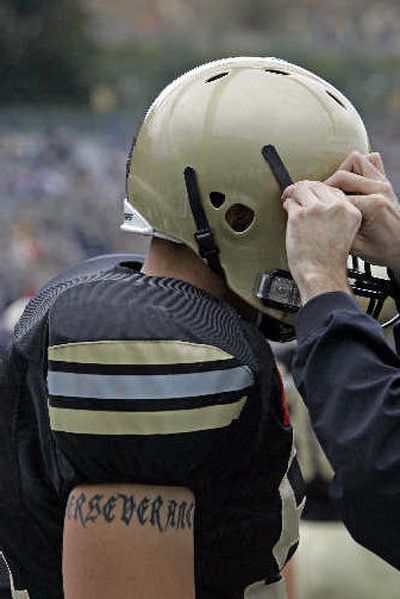Even Army won’t fight tattoo battle

WEST POINT, N.Y. – When Army linebacker Barrett Scruggs arrived at West Point as a freshman, he had to bare everything – including his tattoos.
“One of the first days you pretty much get naked and they take pictures of all the tattoos,” said Scruggs, now a senior. “It was kind of awkward. You’re standing there in a jockstrap with everybody looking at you. They told us beforehand, I was ready for it, but it was still kind of awkward.”
Yes, even the Army’s 204-year-old bastion of character building has been infiltrated by the tattoo generation. Tattoos are allowed at all three service academies, as long as they’re in good taste.
Watch the Army-Navy game Saturday and plenty of ink will be on display.
Still, they’re not exactly embraced by old-school Army brass.
“Before, you couldn’t do it. It’s all changed now,” said Mady Salvani, assistant director of athletic communications at West Point.
To ensure that students don’t add any tattoos while they attend West Point, with enrollment comes the requisite photo shoot.
“It was pretty awkward, but I guess it’s just part of the system,” said freshman quarterback Carson Williams, who is inkless. “My mom doesn’t like tattoos. That’s one thing my mom and the Army have in common.”
Army coach Bobby Ross has been around enough football players to not get flustered by a tattoo or two.
“If it’s something they want to do and have a little fun with, that’s OK,” he said. “Maybe their parents aren’t real happy about it, but it doesn’t make me unhappy.”
Fighting against body art is a losing battle for the academies. About half the people in the United States age 18-29 have either a tattoo or a body piercing other than traditional earrings, according to a study published in June in the Journal of the American Academy of Dermatology.
The study said that figure is growing.
“Times are changing, you know. Most people come in with them,” senior wideout Jeremy Trimble said. “That just shows the diversity we have here. It’s not really a big deal. I don’t have a zillion of them, so it’s all right.”
Dead center on the cover of the Army football media guide is the tattoo that graces Scruggs’ right biceps.
Nobody would begrudge the message on the latest artistic addition to his body – Scruggs had “Watching Over Me, Sacrifice” inscribed after his dad had a heart attack last year.
That violated the academy rule. Apparently, it’s not stringently enforced.
“You’re not legally supposed to get another tattoo until you graduate,” said junior defensive back Caleb Campbell, who has had a tattoo of a Bible verse – “Don’t be afraid. Only believe” – since he was a little boy. “Of course, a lot of people don’t abide by that rule.”
Such as junior quarterback David Pevoto, who has added a tattoo of a cross on his back.
“I wanted to get a tattoo,” Pevoto said. “But I didn’t want to get just anything, a dragon and stuff, that would make my mom upset. I’m a Christian, so I thought a cross would be best. She ended up liking it after about a week. But the initial reaction – she got kind of upset, I guess.
“It doesn’t look bad, but if I could go back and do it over again, I probably wouldn’t get it.”
Ross, who turns 70 in a month, can identify with that sentiment.
“I had a lineman one year at Maryland,” Ross said. “He had a tattoo of his girlfriend’s name with a little heart through it at a spot I’m not going to say, OK? I said, ‘What happens if you break up with that girl?’ And eventually he did. I guess they can remove them now.”
Ross is clean, too. If Army tattoos Navy, he still won’t get one, though he has left the door open.
“If we go undefeated, I’ll get one. But not until then,” Ross said. “And it’ll have to be on my back so nobody sees it.”